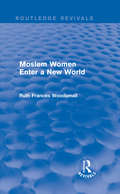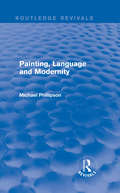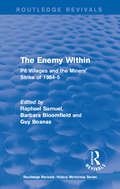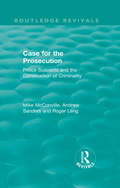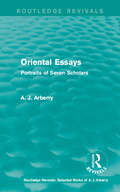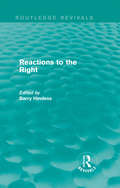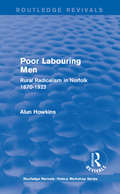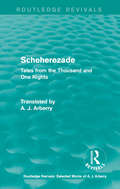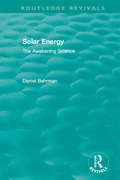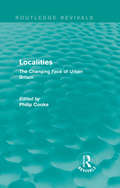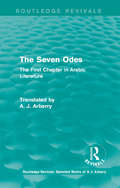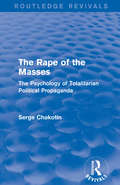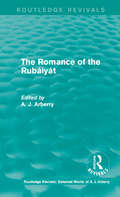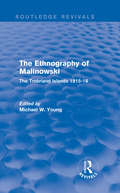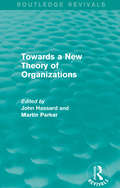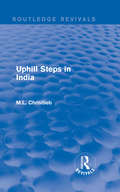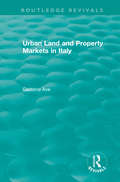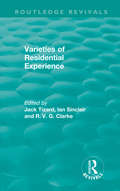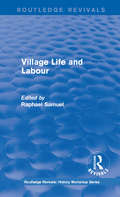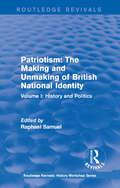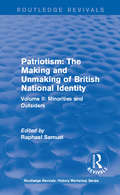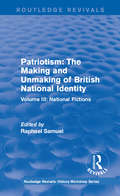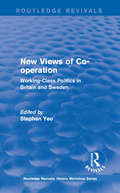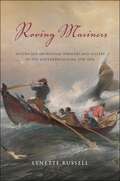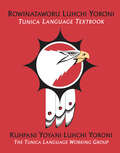- Table View
- List View
Routledge Revivals: Moslem Women Enter a New World (1936)
by Ruth Frances WoodsmallFirst published in 1936, this book surveys the changing place of women across the contemporaneous Muslim world, focusing on several nations where they constitute a demographic majority — Iraq, Iran, Egypt, Palestine, Trans-Jordan, Turkey, Syria — and one where they do not, namely India. It begins by outlining some of the areas of change, for example regarding the veil, purdah and divorce. This is followed by in depth examinations of the progress of female education, their changing economic roles, improving health standards, their widening interests and the pressure for change on Islam in general. This title is would be of interest to students of the sociology of religion and the contemporary position of women in Muslim societies.
Routledge Revivals: Painting, Language and Modernity (1985)
by Michael PhillipsonFirst published in 1985, this book draws together the author’s artistic with analytical practices which had been developed over many years of sociological enquiry. It interprets a ‘work of art’ as a site on which a viewer or critic is invited to share in questioning celebration of the painting itself. The author reassesses modern painting’s relation to its own origins and to tradition in light of the emergence of ‘postmodern’ practice — exploring its engagement of fundamental questions about language and being. Also assessed is the relevance of the metaphors of writings and Reading to an understanding of painting and viewing practices — looking at painters’ writings as well as phenomenological and post-structuralist writers.
Routledge Revivals: Pit Villages and the Miners' Strike of 1984-5 (Routledge Revivals: History Workshop Series)
by Raphael Samuel, Barbara Bloomfield & Guy BoanasFirst published in 1986, this book challenges the notion that the miners’ strike of 1984-5 was ‘Scargill’s Strike’. It shows some of the ways in which the strike, though nominally directed from above, was determined from below by multitudinous and often contradictory pressures — the lodge, the village and the home. The focus is essentially logical and gives particular attention to family economy, kin networks and intergenerational solidarity. At the same time it is concerned with the mentality of the strike — its ruling fears and passions. The first-hand testimonies that comprise the book attest to the attachment to ‘traditional ways’ as well as the potency of the influences corroding them.
Routledge Revivals: Police Suspects and the Construction of Criminality (Routledge Revivals)
by Andrew Sanders Mike McConville Roger LengOriginally published in 1991, The Case for the Prosecution examines the entire process of arrest through to conviction.
Routledge Revivals: Portraits of Seven Scholars (Routledge Revivals: Selected Works of A. J. Arberry #5)
by A. J. ArberryFirst published in 1960, this work describes the lives and labours of six great scholars - Simon Ockley, Sir William Jones, E. W. Lane, E. H. Palmer, E.G. Browne and R. A Nicholson. These men were devoted to building a bridge between the peoples and cultures of Europe and Asia. To these biographical essays, Arberry has added a short autobiography and an eloquent plea for the further encouragement of Oriental studies. This book will be of interest to those studying Middle-Eastern studies and the history of Orientalist study.
Routledge Revivals: Reactions to the Right (Routledge Revivals)
by Barry HindessFirst published in 1990, this book was intended as a counter to the rising and continued strength of the New Right and an attempt to bolster the perceived weakness of the opposition — providing a critical discussion of New Right ideology and also of the more influential Left reactions to them. The contributors scrutinise the attempts to reconstruct the idea of socialism in the 1990s, and pinpoint the relation of socialism to freedom, equality and the market. In the course of this searching evaluation, they also take up issues relating more directly to specific policy areas such as monetary policy and international finance, secondary education, social welfare, and race relations.
Routledge Revivals: Rural Radicalism in Norfolk 1870-1923 (Routledge Revivals: History Workshop Series)
by Alun HowkinsFirst published in 1985, this book presents the first detailed account of the relationship between the farmworkers, trades unionism, and political and social radicalism. Rural radicalism, one of the most important new features of late-nineteenth and early-twentieth century politics, was particularly strong in Norfolk and as such provides the focus for this study. The author shows the how relationship between ‘master and man’ and ‘man’ and ‘work’ was changing in the period from the 1870s to the 1920s — ending with the great strike of 1923. The main themes are the shifts from religion to politics, from Liberalism to Labour, and in more general terms from local to national consciousness. The book shows men at work and the ways in which politics meshed — or failed to mesh — together. Based on detailed local research and on many hours of recorded interviews, it enables the voice of the labourer to be heard, and a real sense of hope, fear and aspiration to come through.
Routledge Revivals: Tales from the Thousand and One Nights (Routledge Revivals: Selected Works of A. J. Arberry #1)
by A. J. ArberryFirst published in 1953, this translation of part of the Arabian Nights by A. J. Arberry offers four famous stories in modern idiom: Aladdin, Judar, Aboukir and Abousir, and the Amorous Goldsmith. The introduction provides a brief analysis of earlier translations of the tales and explains their value as indicators of the society in which they were written. This work will be of interest to those studying Middle-Eastern literature and history.
Routledge Revivals: The Awakening Science (Routledge Revivals)
by Daniel BehrmanOriginally published in 1979, Solar Energy provides a tour of the world of solar energy and asks two key questions: is solar energy the key to the future of our energy needs, and what are the facts and potential of this source of renewable power. The book examines solar energy from the past, to modern plans for designing domestic solar housing, and looks at the sites and the technology applied to harness the Sun's power, such as the energy potential of windmills and the equatorial oceans. Behrman reports on the progress of scientists and manufacturers in making solar energy a viable competitor in the energy market, and studies the projections of a future energy crop for energy plantations.
Routledge Revivals: The Changing Face of Urban Britain (Routledge Library Editions: Social Theory Ser.)
by Philip CookeFirst published in 1989, this book examines seven different localities, ranging from the outer suburbs of large northern cities to small freestanding town, which were prospering in the 1980s or struggling against the negative employment effects of restructuring. Within the theoretical frame of ‘industrial restructuring’, it traces the development of each locality, exploring in depth the influence of several key elements — deindustrialisation, technological change, the shift to the services in employment — on social composition, political change and local policy. A major contribution to locality studies, this book is essential reading for students of urban and regional studies, and sociology.
Routledge Revivals: The First Chapter in Arabic Literature (Routledge Revivals: Selected Works of A. J. Arberry #2)
by A. J. ArberryThese seven poems, translated by A. J. Arberry in 1957, are the most famous survivors of a vast mass of poetry produced in the Arabian Desert in the sixth century. Arberry’s introduction explains to the reader what was known about the poems and how they came to be preserved and distributed over time. The epilogue particularly interrogates the authenticity of the poems and tracks how they have been transmitted over time. This work will be of interest to those studying Persian and Middle-Eastern literature and history.
Routledge Revivals: The Psychology of Totalitarian Political Propaganda (Routledge Revivals)
by Serge ChakotinFirst published in French in 1939, and later in English in 1940, this work by the author, analyses and strongly critiques the effect of Nazi propaganda on the psychology of the masses. By bringing together the political and the psychological, the author refers to the use of propaganda in order to serve the ends of a handful of men as ‘psychical rape’ and warns that this phenomenon cannot be attributed solely to the Nazi regime. The English translation was updated to account for the outbreak of the Second World War in 1939. It will be of great interest to anyone studying the Second World War, Nazism, Fascism and the psychology of propaganda.
Routledge Revivals: The Romance of the Rubáiyát (Routledge Revivals: Selected Works of A. J. Arberry)
by A. J. ArberryFirst published in 1959, this reprint of the first edition of Edward FitzGerald’s translation of the Rubáiyát is accompanied by an introduction and notes by A J Arberry, one of Britain’s most distinguished Orientalist scholars. The Rubáiyát is a selection of poems written in Persian attributed to Omar Khayyám. The work will be of interest to those studying Middle Eastern Literature.
Routledge Revivals: The Trobriand Islands 1915-18 (Routledge Revivals)
by Michael W. YoungBronislaw Malinowski is one of the founding fathers of modern social anthropology and the innovator of the technique of prolonged and intensive fieldwork. His writings about the Trobriand Islands of Papua were in their time the most formative influence on the work of British social anthropologists and are of perennial interest and importance. They produced a revolution in the aims and field techniques of social anthropologists, and the method he created is that now normally used by anthropologists in the field. Malinowski’s field material remains compulsory reading for students. First published in 1979, this book draws from the major monographs of Malinowski to compile a selection of his writings on the Trobriand Islanders. In presenting a concise Trobriand ethnography in one volume, the author gives balanced coverage of economic life, kinship, marriage and land tenure, and to the system of ceremonial exchange known as the Kula. He also provides, in an introductory essay, a critical assessment of Malinowski the ethnographer, and gives a brief account of the Trobriands in a modern perspective.
Routledge Revivals: Towards a New Theory of Organizations (1994)
by Martin Parker John HassardFirst published in 1994, the essays collected in this book explore the impact and current status of the ideas put forth in David Silverman’s The Theory of Organizations, and how they relate to future directions in organization theory. After opening with a chapter by Silverman himself, the subsequent chapters investigate key issues in the study of organizations, including structure and agency, the politics of organization theory, and the meanings of post-positivist organizational analysis. Contemporaneous debates on postmodernism, the emotions, gender and structuration are discussed in the context of the development of organizational theory in the preceding twenty-five years — providing insights into the continuities within organizational theory and provoking thought about future directions.
Routledge Revivals: Uphill Steps in India (1930)
by M.L. ChristliebFirst published in 1930, the author asserts that this book presents a human India ‘in all sorts of conditions and moods’. It details her first-hand experiences as a female missionary in India over the course of thirty-three years in India along with some further accounts related by eyewitnesses. It avoids proposing theories of giving abstract general pronouncements but instead focuses on the individual people with the intention that it would promote greater understanding of the nation by westerners. This book will be of interest to students of Indian, colonial and women’s history.
Routledge Revivals: Urban Land and Property Markets in Italy (Routledge Revivals)
by Gastone AveOriginally published in 1996, Urban Land and Property Markets describes the intricacies of the Italian urban planning system, and the interconnections between the property sector, the national economy, and recent historical developments, including the new challenges facing Italy after the early 1990s collapse of the party system. The book’s underlying thesis is that property values are ultimately created by urban planning and investment in infrastructure. Negotiations between local government and developers focus on three basic issues: the ultimate use of urban land, the quantitative control of development via planning permissions relating to city master plans, and the nature of public investment to support growth and property values.
Routledge Revivals: Varieties Of Residential Experience (1975) (Routledge Revivals)
by Ian Sinclair Jack Tizard R.V.G. ClarkeFirst published in 1975, this book compiles a number of studies concerning institutional care and children, which address the question of why institutions that serve apparently similar functions differ so much. The book uses comparative methods such as measurement of different ‘dimensions’ of institutional care and analysis of interrelationships among specific structural and functional features which characterise particular institutions. As a result, the book draws broad conclusions about the importance of factors that have dynamic influence on the manner in which institutions function and the reasons why they differ. The editors reject the ‘steampress’ model which postulates that institutions are more or less alike. They discuss ideological and organisational variation, differences in staffing and the manner in which children respond to them, and consider these issues as factors that influence the way in which an institution functions ‘as a whole’. Subsequent chapters describe comparative studies carried out in institutions for the mentally handicapped, approved schools, residential nurseries, probation hostels, other ‘correctional’ institutions and units for autistic children. The book enables the reader to appreciate achievements and shortcomings of contemporary research and thinking in this field.
Routledge Revivals: Village Life and Labour (Routledge Revivals: History Workshop Series)
by Raphael SamuelFirst published in 1975, this volume aims to direct attention at a number of aspects of the lives and occupations of village labourers in the nineteenth-century that have been little examined by historians outside of agriculture. Some of the factors examined include the labourer’s gender, whether they lived in ‘closed’ or ‘open’ villages and what they worked at during the different seasons of the year. The author examines a range of occupations that have previously been ignored as too local to show up in national statistics or too short-lived to rank as occupations at all as well as sources of ‘secondary’ income. The analysis of all of these factors in related to the seasonal cycle of field labour and harvests. The central focus is on the cottage economy and the manifold contrivances by which labouring families attempted to keep themselves afloat.
Routledge Revivals: Volume I: History and Politics (Routledge Revivals: History Workshop Series)
by Raphael SamuelFirst published in 1989, this is the first of three volumes exploring the changing notions of patriotism in British life from the thirteenth century to the late twentieth century and constitutes an attempt to come to terms with the power of the national idea through a historically informed critique. This volume deals with the role of politics, history, religion, imperialism and race in the formation of English nationalism. In chapters dealing with a wide range of topics, the contributors demystify the prevailing conceptions of nationalism, suggesting ‘the nation’ has always been a contested idea, and only one of a number of competing images of collectivity.
Routledge Revivals: Volume II: Minorities and Outsiders (Routledge Revivals: History Workshop Series)
by Raphael SamuelFirst published in 1989, this is the second of three volumes exploring the changing notions of patriotism in British life from the thirteenth century to the late twentieth century and constitutes an attempt to come to terms with the power of the national idea through a historically informed critique. This volume examines how national identity has competed with alternative, more personal forms of belonging — such as Roman Catholicism, Judaism and Nonconformism — as well looking at femininity in relation to the state. Contemporary British society’s capacity to create outsiders is discussed and the introductory essay shows how this may shape our misunderstanding of earlier phases of national development.
Routledge Revivals: Volume III: National Fictions (Routledge Revivals: History Workshop Series)
by Raphael SamuelFirst published in 1989, this is the third of three volumes exploring the changing notions of patriotism in British life from the thirteenth century to the late twentieth century and constitutes an attempt to come to terms with the power of the national idea through a historically informed critique. This volume studies some of the leading figures of national myth, such as Britannia and John Bull. One group of essays looks at the idea of distinctively national landscape and the ways in which it corresponds to notions of social order. A chapter on the poetry of Edmund Spenser explores metaphorical representations of Britain as a walled garden, and the idea of an enchanted national space is taken up in a series of essays on literature, theatre and cinema. An introductory piece charts some of the startling changes in the image of national character, from the seventeenth-century notion of the English as the most melancholy people in Europe, to the more uncertain and conflicting images of today.
Routledge Revivals: Working-Class Politics in Britain and Sweden (Routledge Revivals: History Workshop Series #9)
by Stephen YeoFirst published in 1988, this book sets out to reinterpret the changing place of working-class association in capitalist Britain. It argues that in combination, co-operation and association constitutes labour’s power — what is has to work with and who to work for — yet social historians have tended to overlook such views in a co-operative setting. What was the struggle, what form did it take, who were the protagonists and what relevance did they have to the community co-operators of the 1980s? The essays collected in this book explore class potential and class conflict within and against co-operative thought and practice.
Roving Mariners: Australian Aboriginal Whalers and Sealers in the Southern Oceans, 1790–1870 (SUNY series, Tribal Worlds: Critical Studies in American Indian Nation Building)
by Lynette RussellFor most Australian Aboriginal people, the impact of colonialism was blunt—dispossession, dislocation, disease, murder, and missionization. Yet there is another story of Australian history that has remained untold, a story of enterprise and entrepreneurship, of Aboriginal people seizing the opportunity to profit from life at sea as whalers and sealers. In some cases participation was voluntary; in others it was more invidious and involved kidnapping and trade in women. In many cases, the individuals maintained and exercised a degree of personal autonomy and agency within their new circumstances. This book explores some of their lives and adventures by analyzing archival records of maritime industry, captains' logs, ships' records, and the journals of the sailors themselves, among other artifacts. Much of what is known about this period comes from the writings of Herman Melville, and in this book Melville's whaling novels act as a prism through which relations aboard ships are understood. Drawing on both history and literature, Roving Mariners provides a comprehensive history of Australian Aboriginal whaling and sealing.
Rowinataworu Luhchi Yoroni / Tunica Language Textbook
by Kuhpani Yoyani Luhchi Yoroni / The Tunica Language Working GroupThe essential guide for learning the Tunica language.For many years, the Tunica-Biloxi Tribe of Louisiana collaborated with students and faculty at Tulane University on a project to revitalize the Tunica language. Tunica had not been spoken or used regularly in the community since the last known speaker, Sesostrie Youchigant, passed away in 1948. The center of the revitalization of the Tunica language is this first-of-its-kind, beginning Tunica language textbook.The Tunica Language Textbook (Rowinataworu Luhchi Yoroni) contains everything needed to become conversationally fluent in Tunica. Like other language textbooks, it contains vocabulary and grammatical information, as well as practice exercises that develop both comprehension and production of Tunica, and acquisition of the patterns, not just the forms. The textbook contains links to an online pronunciation guide and includes a wealth of information on cultural topics, from stickball to basketry to naming to cosmology, and uses the language to do so. Wherever possible, excerpts from the original documentation of Tunica stories and myths have been included, so that students can become acquainted with native-like language use.Each chapter is structured to lead the student through the stages of learning, from presentation of new information, to recognition, to identification, to application. While there is explanation of the topics in English, the lessons are designed to be used in an immersion classroom setting as well as for individual use.
